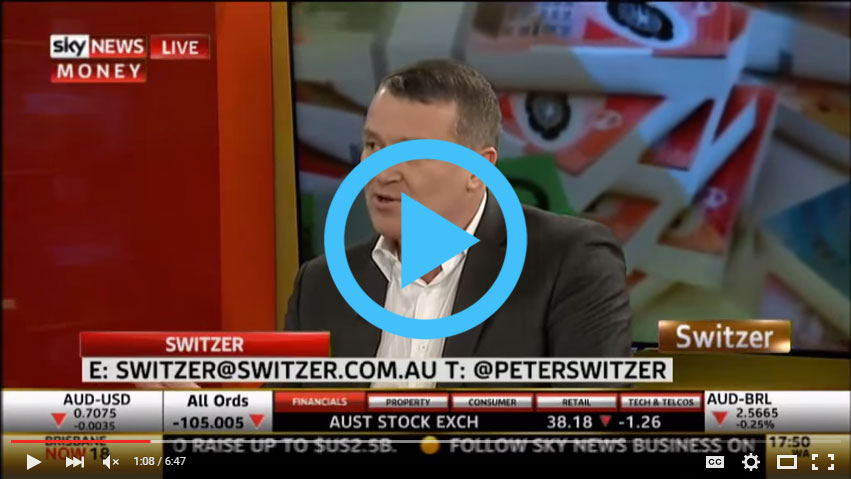Soprano Design recently appeared on Sky News with Peter Switzer to discuss enterprise use of mobile messages and how business messaging is different from the personal messages most consumers send every day. View the video above or take a look at the transcript below.
Peter Switzer: Welcome back to Switzer. A small firm in North Sydney is now the world’s largest mobile messaging technology provider to mobile network operators. How did that happen? Soprano Design provides the answer.
Soprano Design: It’s great to be here, Peter.
Switzer: I call you a small company. Your turnover’s about $10 mil or so, isn’t it?
Soprano Design: No, it’s more than that. We’re a private company so we don’t disclose our revenue figures but we are growing very quickly.
Switzer: Someone gave me a figure like that, a turnover of $10 million for you guys here, but maybe they were off. Anyway, the point is this: You are the largest mobile messaging technology provider to mobile network operators. So therefore you must work with Telstra.
Soprano Design: We do work with Telstra, and let me help you out. We’ve been around for 20 years. Our core software, it’s a cloud software solution that powers the delivery of business SMS messages.
Switzer: Why is there a difference between business and the silly SMS messages that we all send to our friends and family?
Soprano Design: We call that consumer messaging, and this is where our kids and ourselves send text messages to each other. One of the interesting trends in the industry is that peer-to-peer messaging is actually on the decline, and if you look at New Year’s Eve two years ago here in Sydney, there were actually fewer text messages sent person to person than the year before. Every other year it’s gone up.
Switzer: Is that because Instagram and all those sort of things are getting in the way — people want to take photographs of their food for inexplicable reasons?
Soprano Design: That’s exactly what’s happened but, of course, business messaging — the use of SMS by businesses — has been on the increase. So if you do your banking online and you get a text message from your bank with a one-time password to authenticate that transaction, if your airline sends you a text message saying your flight’s running late, or even if your kids are getting their Year 12 results SMS’d to their phone, then the chances are that Soprano’s software is powering the delivery of that message. It’s probably fair to say that more than half the Australian population would get a message from our software at some point.
Switzer: So, why did you need to have a separate kind of software for business as opposed to the social one?
Soprano Design: Because in general, it’s business processes that are sending the message out. So unlike a person to person message where I send an SMS to my wife or to my kids, in the case of business messaging, a server or a system is sending a message.
Switzer: It’s highly automated.
Soprano Design: So it’s a different game. It’s a different game from traditional person-to-person messaging and the key point is that business is growing. It’s a $50 billion business globally and it’s growing 15% year on year.
Switzer: And I presume there’s a much higher security demand, that it can’t be interfered with maybe as easy as a personal message.
Soprano Design: And it’s not just security: It’s availability. When businesses need services they need a higher level of security, they need a higher level of availability. So that’s what businesses demand.
Switzer: It says here you’re the largest mobile messaging technology provider to mobile network operators. Now I’m thinking to myself, you must have a presence in other countries. I also presume that Telstra’s such a big operator in its own right, does that give you, well, this leverage in terms of your size?
Soprano Design: The way we work as a software company is we distribute our software through carriers like Telstra here and around the world. So carriers are smart buyers, they go out and they pick the best software in the world to deliver to their enterprise customers, and we’ve been working with Telstra for many years.
We’ve got a very strong partnership and relationship with the team at Telstra, but our business is a global business. More than 75% of our revenue is coming from overseas markets, similar to how we work with Telstra in Australia. If you’re in some other countries and get a package delivered to your house, you’ll get a text message saying the package has arrived. That’s being delivered through one of the top carriers in that market.
If you go to the UK, again, it’s the number one carrier in that market. They chose Soprano software to deliver text messages around the country. So if you get a reminder to turn up to your GP or a reminder to take your medication, it will be our software that will be delivering that.
Switzer: But it must have been tough for you to resist not listing this operation, given the kind of goals you’ve been kicking.
Soprano Design: Well, the business is in great shape. We’re growing very strongly. Last year Deloitte named us in their Fast 50, so one of the fastest growing technology companies in the country. For a company that is established and more than 20 years old, we feel like a young company.
Switzer: It took you 20 years to be an overnight success.
Soprano Design: That’s always the way. And the way Deloitte measures that is the revenue growth over the previous two years, and I think last year that was around the 100% mark. This year it will be more than 120%. So not only are we growing quickly, our rate of growth is increasing.
Switzer: But given that, is there going to be a time when your capital requirements will be such that you might have to think about listing?
Soprano Design: Really, an IPO is an issue for our shareholders, but it’s fair to say that we have lots of options on the table and if we ever go down that path I’m sure you’ll have us back on the show, Peter.
Switzer: Yeah, without a doubt. And I guess there’d be a lot of private investors who’d be happy to jump on board the current rolling wagon.
Soprano Design: Well yes. I mean, that’s an issue for the shareholders in terms of what they want to do.
Switzer: What’s your feeling about the Aussie economy?
Wiltshire: So we look at the Australian economy, like I say, it’s probably only a quarter of our revenue. We remain bullish. When you’re in the software business it gives you a lot of resilience to the ups and downs because cloud-based services, they’re recurring revenues, and our challenge really is about managing growth. If we look at all the countries we’re in around the world — more than a dozen — I’ll be honest, what’s going on in Brazil is probably more of a concern for us today than it is here in Australia.
Switzer: Does a lower dollar help your ultimate revenue?
Soprano Design: Yes, it does. Ultimately, because most of our revenues are overseas, a low dollar is good, but it’s one of those things that we don’t spend too much time focusing on because we’d rather actually drive the bottom line, drive the business, and the rest will take care of itself.
Switzer: Great to talk with you. Thanks for coming on the show.
Ready to improve your own workflows with secure mobile messaging? See how one business is increasing employee productivity.


